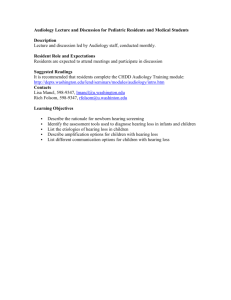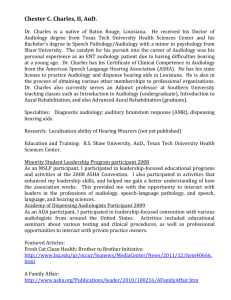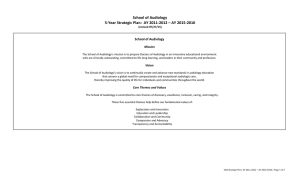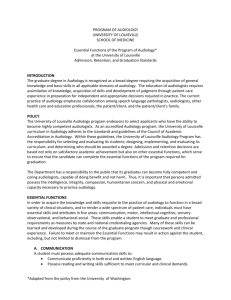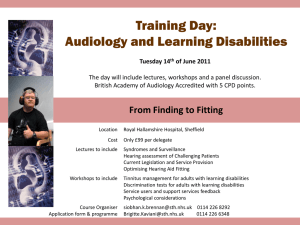PACIFIC UNIVERSITY SCHOOL OF AUDIOLOGY
advertisement
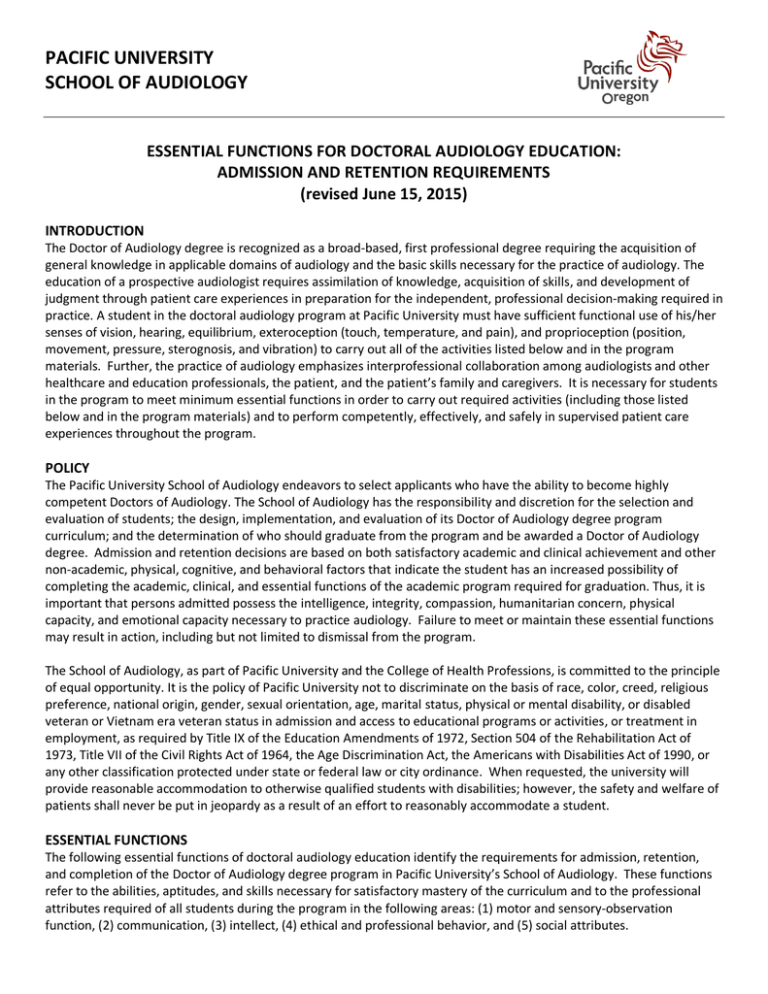
PACIFIC UNIVERSITY SCHOOL OF AUDIOLOGY ESSENTIAL FUNCTIONS FOR DOCTORAL AUDIOLOGY EDUCATION: ADMISSION AND RETENTION REQUIREMENTS (revised June 15, 2015) INTRODUCTION The Doctor of Audiology degree is recognized as a broad-based, first professional degree requiring the acquisition of general knowledge in applicable domains of audiology and the basic skills necessary for the practice of audiology. The education of a prospective audiologist requires assimilation of knowledge, acquisition of skills, and development of judgment through patient care experiences in preparation for the independent, professional decision-making required in practice. A student in the doctoral audiology program at Pacific University must have sufficient functional use of his/her senses of vision, hearing, equilibrium, exteroception (touch, temperature, and pain), and proprioception (position, movement, pressure, sterognosis, and vibration) to carry out all of the activities listed below and in the program materials. Further, the practice of audiology emphasizes interprofessional collaboration among audiologists and other healthcare and education professionals, the patient, and the patient’s family and caregivers. It is necessary for students in the program to meet minimum essential functions in order to carry out required activities (including those listed below and in the program materials) and to perform competently, effectively, and safely in supervised patient care experiences throughout the program. POLICY The Pacific University School of Audiology endeavors to select applicants who have the ability to become highly competent Doctors of Audiology. The School of Audiology has the responsibility and discretion for the selection and evaluation of students; the design, implementation, and evaluation of its Doctor of Audiology degree program curriculum; and the determination of who should graduate from the program and be awarded a Doctor of Audiology degree. Admission and retention decisions are based on both satisfactory academic and clinical achievement and other non-academic, physical, cognitive, and behavioral factors that indicate the student has an increased possibility of completing the academic, clinical, and essential functions of the academic program required for graduation. Thus, it is important that persons admitted possess the intelligence, integrity, compassion, humanitarian concern, physical capacity, and emotional capacity necessary to practice audiology. Failure to meet or maintain these essential functions may result in action, including but not limited to dismissal from the program. The School of Audiology, as part of Pacific University and the College of Health Professions, is committed to the principle of equal opportunity. It is the policy of Pacific University not to discriminate on the basis of race, color, creed, religious preference, national origin, gender, sexual orientation, age, marital status, physical or mental disability, or disabled veteran or Vietnam era veteran status in admission and access to educational programs or activities, or treatment in employment, as required by Title IX of the Education Amendments of 1972, Section 504 of the Rehabilitation Act of 1973, Title VII of the Civil Rights Act of 1964, the Age Discrimination Act, the Americans with Disabilities Act of 1990, or any other classification protected under state or federal law or city ordinance. When requested, the university will provide reasonable accommodation to otherwise qualified students with disabilities; however, the safety and welfare of patients shall never be put in jeopardy as a result of an effort to reasonably accommodate a student. ESSENTIAL FUNCTIONS The following essential functions of doctoral audiology education identify the requirements for admission, retention, and completion of the Doctor of Audiology degree program in Pacific University’s School of Audiology. These functions refer to the abilities, aptitudes, and skills necessary for satisfactory mastery of the curriculum and to the professional attributes required of all students during the program in the following areas: (1) motor and sensory-observation function, (2) communication, (3) intellect, (4) ethical and professional behavior, and (5) social attributes. (1) Motor and Sensory-Observation Function The student must: a. Observe demonstrations and visual presentations in lectures, audiologic laboratories, and clinics; b. Have sufficient motor and sensory function to observe patients accurately and completely at a distance and close at hand, elicit information from them related to audiologic diagnostics and treatment, and identify a patient’s normal and disordered communication and behavior related to hearing and balance; c. Have sufficient motor function, vision, hearing, touch, and dexterity to integrate and coordinate both gross and fine motor movements, hand/eye coordination, equilibrium, and sensation; execute movements required to provide audiologic care of patients; and effectively manage physical conditions in order to prevent impediments to appropriate services; d. Effectively manipulate equipment and instruments necessary to perform audiologic diagnostic tests and rehabilitation treatments, and to work with patient-utilized equipment (e.g., durable medical equipment, including hearing aids, hearing assistance technology devices, etc.), and efficiently manipulate the diagnostic and treatment environment and materials without violation of diagnostic and treatment protocols and best practices; e. Visualize and identify anatomic structures; visualize and discriminate findings on imaging studies; discriminate text, numbers, tables, and graphs associated with diagnostic instruments and tests; and accurately monitor, through both visual and auditory modalities, equipment and instrument displays and controls, including those of hearing instruments and clinical equipment, used for the diagnosis and treatment of patients and the conduct of laboratory assignments in the hearing and balance sciences and clinical audiology; f. See with measurable depth perception and in low-light conditions (e.g., in sound-isolated booths, during vestibular assessment, etc.), distinguish color variations, and discern shades of black and white; g. Hear, understand, and accurately communicate verbally; h. Sit, bend, and reach while performing daily job functions, function in a structured environment for several hours, sustain necessary physical activity level required in classroom and clinical activities, and maneuver in small spaces (e.g., sound-isolated booths); i. Respond quickly to provide a safe environment for patients in emergency situations (e.g., fire, choking, etc.). (2) Communication The student must: a. Communicate effectively with patients, both verbally and auditorily, and effectively observe patients in order to elicit information and perceive a patient’s verbal and non-verbal communication; b. Effectively and efficiently describe patient behavior, test results, and related technical information (e.g., as related to amplification, etc.); c. Communicate clearly, effectively, and sensitively with patients in both oral and written English; d. Write effectively, including making clear and legible handwritten notes in patient charts and preparing appropriately written and referenced essays, reports, research and other scholarly papers, patient documentation, and other classroom, laboratory, and clinical written assignments as part of course work and clinical practice; e. Read at a level to comprehend curriculum and clinical content in doctoral-level audiology education; f. Be computer literate at a level to utilize computers effectively in classroom, laboratory, and clinical education environments, including accessing technology for clinical management (e.g., billing, charting, etc.); g. Communicate effectively and efficiently with other members of the healthcare team and the public, in oral, written, and electronic form, in a manner that enhances the dignity and image of the audiology profession; h. Perceive and demonstrate appropriate non-verbal communication for culture and context; modify communication style to meet the communication needs of patients, caregivers, and other persons served; and convey information accurately with relevance and cultural sensitivity; Pacific University – Essential Functions for Doctoral Audiology Education | revised 06/15/15 | Page 2 i. Recognize when patients and/or family members and caregivers do or do not understand written and/or verbal communication, and modify and adapt the communication appropriately. (3) Intellect The student must: a. Have sufficient intellectual abilities, including comprehension, retention, measurement, evaluation, reasoning, analysis, inference, integration, and synthesis, to meet curricular and clinical demands and the critical skill of problem-solving; b. Possess sufficient intellectual capacity to collect and analyze complex audiologic data and both written and verbal patient history information, and to comprehend three-dimensional relationships and the special relationships of structures, in order to interpret patient findings, recognize anomalies, reach logical conclusions, make sound clinical judgments, and make recommendations which improve patient care; c. Demonstrate the ability to identify complex problems and reach conclusions through reading and comprehension of technical materials, audiologic and medical information, and audiologic and medical texts and journals; d. Comprehend, analyze, and synthesize complex program content, utilize detailed written and verbal instruction to meet curricular and clinical demands, concentrate on the task at hand amidst a variety of environmental distractions, and apply prior learning to new situations; e. Self-evaluate, identify, and communicate limits of one’s own knowledge and skills related to appropriate professional levels and expectations, and identify and utilize resources in order to increase knowledge and skills to appropriate professional levels and expectations. (4) Ethical and Professional Behavior The student must: a. Understand the basis and content of ethics in audiology, conduct his/herself in an ethical manner, and uphold professional ethics in audiology; b. Comply with established university and school policies and procedures, and abide by the laws and regulation pertaining to the practice of audiology in the jurisdiction in which professional activities are being conducted; c. Maintain accuracy and confidentiality of patient information by protecting medical, personal, academic, financial, or business information, and by respecting professional confidences; d. Foster a professional attitude and a positive environment for learning; work both independently and as team member; interact well with individuals, small groups, and large audiences; and establish sufficient rapport and maintain boundaries in order to effectively relate to fellow students, patients, healthcare professionals, clinical supervisors and preceptors, faculty, and staff; e. Present a professional appearance and demeanor; f. Manage one’s circumstances in ways that do not restrict balanced services to patients, including having access to appropriate transportation to clinical and academic placements to allow full participation in the academic and clinical activities for the defined work day; g. Manage one’s circumstances in ways that do not restrict access to appropriate computer technology and internet access, both during and after classes and other program activities, including evenings and weekends, in order to allow full participation in and complete professional, technical, clinical, and curricular assignments, tasks, and examinations. (5) Social Attributes The student must: a. Display mature, sensitive, effective, and culturally appropriate professional relationships by exhibiting attributes that include compassion, integrity, empathy, altruism, responsibility, tolerance, and concern; b. Possess the interpersonal skills necessary to interact in a positive and professional manner with people from all levels of society, cultural backgrounds, and belief systems; and provide care to all regardless of age, race, ethnicity, origin, physical or mental status, or other condition or status; Pacific University – Essential Functions for Doctoral Audiology Education | revised 06/15/15 | Page 3 c. Possess the emotional stability for full utilization of his/her intellectual capacity, to exercise sound judgment and complete all responsibilities attendant to the audiologic diagnosis and treatment of patients; and possess the necessary mechanisms to accept suggestions and criticism and to respond appropriately through modification of behavior; d. Manage the use of time effectively, organize tasks, set priorities, problem solve, and multitask at a sufficient level to complete professional, technical, clinical, and curricular tasks; e. Function effectively under stress and adapt to changing and demanding environments while maintaining both professional demeanor and emotional health; f. Maintain physical and mental health and self-care to a level that does not to jeopardize the health and safety of self and others in the academic and clinical setting. UNIVERSITY LEARNING SUPPORT SERVICES Pacific University provides services and reasonable accommodations to students covered under the Americans with Disabilities Act. Additional information is available via the university’s Office of Learning Support Services (LSS) website, www.pacificu.edu/about-us/offices/learning-support-services. A student who requires accommodations is strongly encouraged to contact LSS at 503.352.2194 or lss@pacificu.edu as soon as a potential service or accommodation is anticipated in order to determine and document the need for services and accommodations. A student who receives accommodations is strongly encouraged to discuss his/her needs with school administration and appropriate faculty and clinical preceptors. PROGRAM-SPECIFIC INFORMATION Students admitted into Pacific University’s Doctor of Audiology degree program must: a. Satisfactorily complete a background check and a drug test and document required immunizations and a TB test prior to the start of classes in the first semester of the program; b. Complete various training, including but not limited to training on sexual harassment, bloodborne pathogens, and the Health Insurance Portability and Accountability Act (HIPAA), during the first semester of the program and then annually; c. Adhere to accepted professional and ethical standards of behavior, which will be evaluated throughout the program; d. Be aware that the program utilizes a modified block system and that the curricular blocks are administered as Pass/No Pass based on an 85% competency; e. Be aware that the school may have additional procedures for students to complete upon admission to the program and will have additional policies and procedures in place for all students to adhere to throughout the program. ACKNOWLEDGEMENT My signature below affirms that I have read and understand the above Essential Functions for Doctoral Audiology Education at Pacific University, including the program-specific information, agree with its content, am committed to the policies expressed therein, am able to perform all of the essential functions needed to satisfactorily complete the requirements for the program, and understand that I may be dismissed from the program should I fail to meet or maintain one or more essential functions during the program despite reasonable accommodation(s) (if recommended by the university’s Office of Learning Support Services). ___________________________________________________ Print Name ___________________________________________________ Sign Name ______________________________ Date Pacific University – Essential Functions for Doctoral Audiology Education | revised 06/15/15 | Page 4
